28 Nov 2023
ASEAN Young Gen team to push indigenous “Cultural Wisdom” at Climate Change conference
Bangkok — How did people live in the pre-oil era? A life free of gas-guzzling cars, electricity, aircraft, condominiums, etc, was quite comfortable, apparently. According to the Southeast Asian Cultural Heritage Alliance (SEACHA), people had more than enough know-how to “manage land, forests, rivers and seas that are climate-friendly, sustainable, and adaptable; age-old methods for building houses and laying out cities that suit the climate, minimize stress on the planet’s resources, and blend well with new technology; and on spiritual traditions that wrap nature together with humanity.”
Today, those traditional ways of life are called “cultural wisdom”. After more than a century of “development” and “economic growth” powered by fossil fuels, the planet is paying the price of shunning that “cultural wisdom”. Voices calling for a reversal of course are growing louder.
At the Climate Change conference (COP28) in Dubai in early December, a group of Young Gen representatives from Thailand, Myanmar, Malaysia, Vietnam, Indonesia, Lao and Singapore will be pushing to advance that cause. The speakers will represent SEACHA and The Siam Society Under Royal Patronage, coordinating with the Climate Heritage Network (CHN) and Jordan’s Petra National Trust (PNT). Along with a number of Southeast Asian academics and civil society experts of traditional cultural wisdom, they will speak at COP28 events covering a range of topics, including climate change in the urban context of Asian culture and how language barriers hinder the implementation of climate action policies.
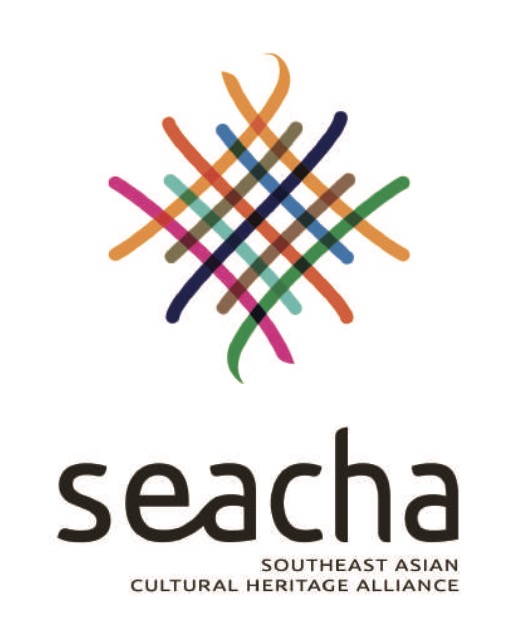
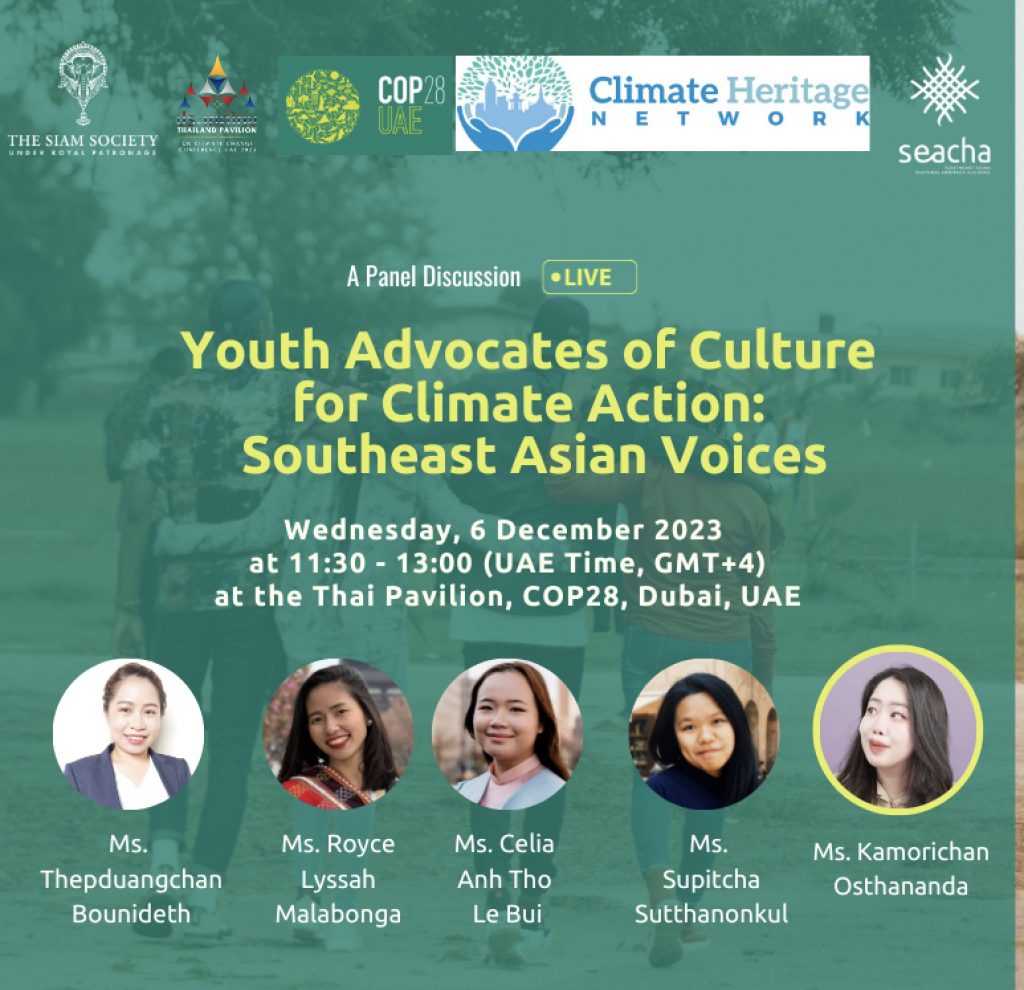
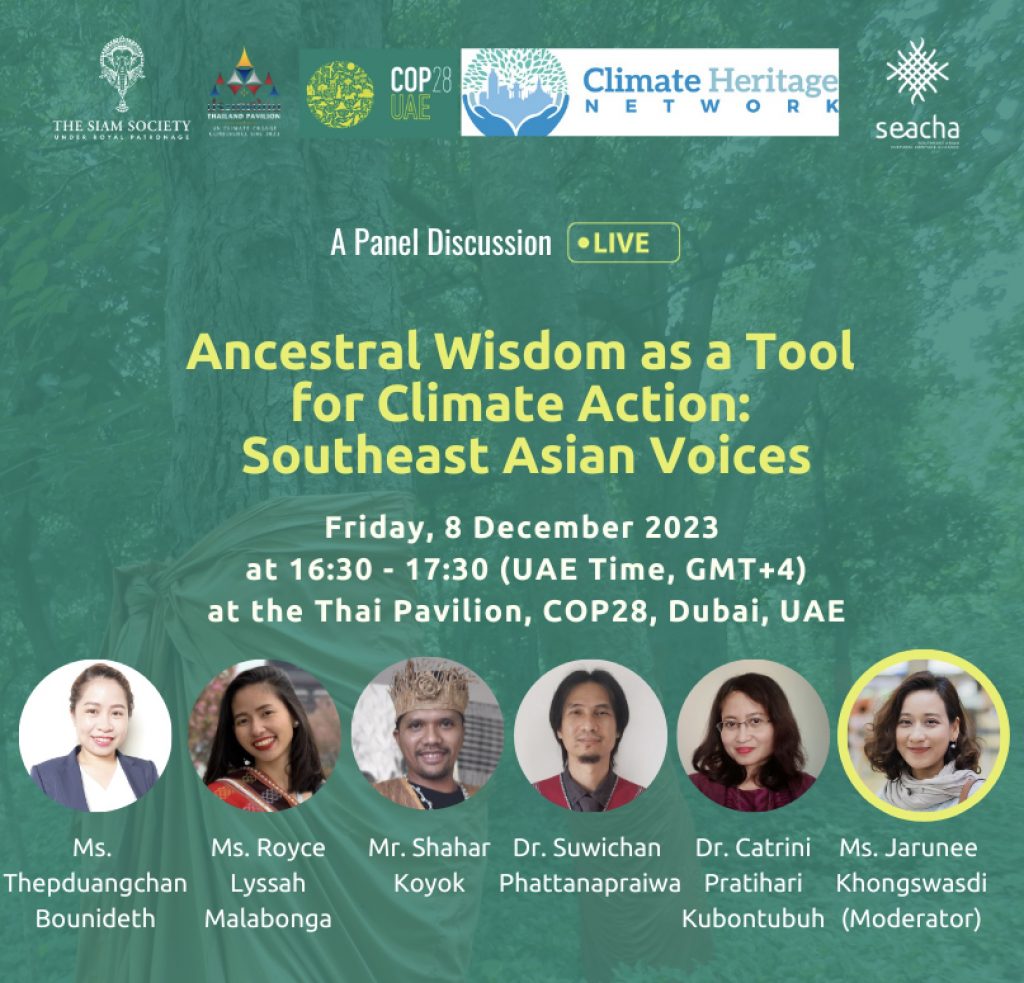
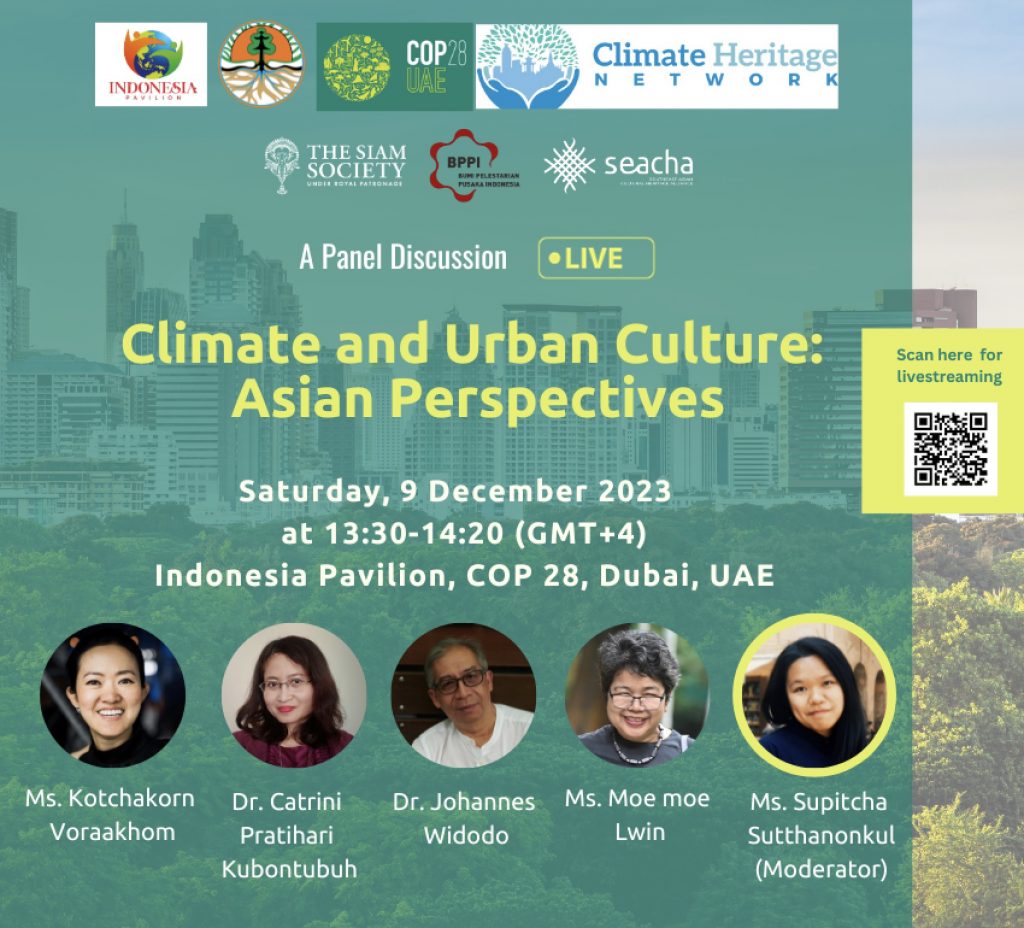
A Call to Action released by SEACHA, The Siam Society, PNT, and CHN last November appeals to negotiators at COP28 to put cultural heritage, arts and creative industries at the heart of climate action and supplement solutions that rely solely on technology. It says, “Culture is a powerful force that shapes all of our lives, wherever we are in the world. Yet in spite of its potential, culture has not been integrated into climate policy and planning. Culture-led solutions that are inclusive, local as well as global, and focused on people and nature are already abundant.
“Cultural heritage, including traditional knowledge, strengthens resilience, helps communities to adapt to climate impacts, protects places, and offers green, circular and regenerative solutions. The arts speak to hearts and minds, inspiring action and helping us to understand climate change through storytelling and shared experiences. The creative industries – design, music, fashion and film – shape our lifestyles, tastes and consumption patterns.
“To strengthen global climate action, we must urgently harness the extraordinary potential of cultural heritage, arts and creative sectors to help people imagine and realise low-carbon, just, climate resilient futures.”
For the full call to action and signatures to the campaign, visit the CHN website at https://www.climateheritage.org/signatories
Says Ms. Jarunee Khongswasdi, cultural heritage expert of The Siam Society and SEACHA, “By delving deeper into the wisdom of our ancestors and their careful, respectful use of natural resources, we can discover invaluable insights that can fundamentally transform our mindset. This, in turn, can reshape the way we manage our limited resources on our one and only planet Earth.”
Adds Mrs. Bilaibhan Sampatisiri, President of the Siam Society, “Nature and culture are significant parts of human life that are inherently intertwined and cannot be separated. To effectively address the pressing climate issues of our time, it is imperative to place culture at the very core of our solutions.”
In 2019, at a pan-Asian conference on “Heritage Protection: The Asian Experience” held in Bangkok, activists, academics, practitioners and a highly engaged audience explored the experience of protecting cultural heritage within the Asian socio-cultural and political context. This event showed there was a wealth of local wisdom in the region to pursue Asia’s own vision of cultural heritage protection, but no organisation to drive it.
That led to the formation of SEACHA, whose founding members are: the Indonesian Heritage Trust; Yangon Heritage Trust; Penang Heritage Trust; The Heritage Conservation Society, Philippines; The Siam Society Under Royal Patronage; Center for Research and Promotion of Cultural Heritage of Vietnam; Mulberries, Lao PDR; and Singapore Heritage Society. SEACHA’s current activities include a monthly online talk called “Cha-Time with SEACHA”, an annual Cultural Heritage Management Clinic, and biennial conferences. The SEACHA logo is inspired by the basketweaving skills that are part of the cultural heritage found across the region.
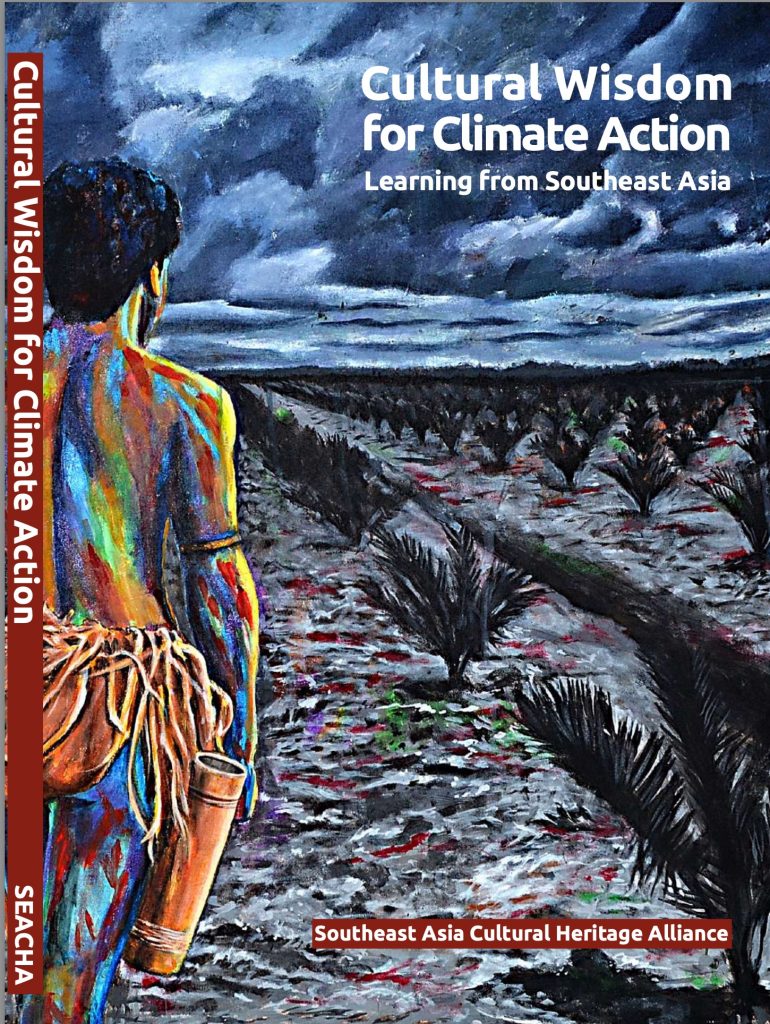
In January 2023, SEACHA and The Siam Society brought together a group of experts and youth leaders from the ten nations of ASEAN for a three-day conference under the the topic of “Cultural Wisdom for Climate Action: the Southeast Asian Contribution.” The presentations have all been compiled into a single volume, the introduction to which says:
“As the prospects for averting catastrophic levels of global climate change dim, governments and international organizations convene ever more conferences, which conclude with commitments to reduce carbon emissions, explore carbon sequestration, and aid developing countries exposed to devastation from droughts, floods, heatwaves and rising seas. Solemn pledges are made, couched in turgid diplomatic prose. Results are disappointing.
“At these international forums, hopes rest primarily on technological solutions which will enable countries to avoid fundamental change in their ways of life. Vested interests, domestic political constraints, and international power rivalries block any commitment to the transformative actions that are required to protect the planet.
“Amongst all the technological approaches to the climate challenge, cultural heritage is overlooked. We tend to look forward to technological solutions to problems that technology itself created, but we lack the imagination to look back at indigenous and ancestral ways of living that were climate friendly, environmentally benign, and eminently sensible. This accumulated wisdom can enable us to imagine a different future that no longer accepts the inevitability of our present “take and waste” way of living that is poisoning our air, land, and water.
“In recent years, however, civil society, primarily in Europe, the Americas and Africa, has pointed out lessons are at hand in the traditional knowledge and ways of life embedded in our cultural heritages, but largely forgotten. We just need to open our eyes and minds to find them.”
The SEACHA delegation at COP28 was also formed as an outcome of the January 2023 conference. It includes:
Ms. Moe Moe Lwin: Trained in architecture and received an M.Sc in Urban Planning from the Asian Institute of Technology, Bangkok. She practiced as an architect for over 22 years, and has volunteered in professional affairs for nearly 20 years. She is currently the Director of Yangon Heritage Trust, an independent non-profit organization working to promote and protect Yangon’s unique heritage, since it was founded in 2012 and is the Vice-Chairperson of the Southeast Asian Cultural Heritage Alliance.
Mr. Shahar Koyok: Also known as Shaq Koyok, is a contemporary artist of the indigenous Temuan tribe of Selangor. Many of his works reflect the early trauma of encroachment on the jungle around his village by land developers. This personal history has also fueled his passion to fight for the land rights of his people. He explores many media of art in
his work, from contemporary painting to installation art.
Ms. Kamorichan Osthananda: A Thai humanitarian interested in post-colonial development through psychological and intersectional lenses. She has served as a panelist for the Digital Sexuality Education Conference Asia-Pacific 2021 supported by the UNFPA,UNICEF, and UNESCO. She has also participated in the World Bank Group Youth Summit 2022: Unlocking the Power of Inclusion for Equitable Growth, and been featured in media for her advocacy on menstrual equity. She is a SEACHA Youth Alumni.
Ms. Anh Tho Le Bui “Celia”: A SEACHA Youth Alumni, social justice advocate, and artist based in New York hailing from Hồ Chí Minh City, Vietnam. She currently works for the Center for Innovation in Mental Health at the City University of New York’s Graduate School for Public Health and Health Policy. Celia obtained her B.A. in Linguistics and East Asian Studies from Columbia University and is passionate about indigenous languages, queer liberation, grassroots organizing, and health justice.
Ms. Supitcha Sutthanonkul: SEACHA Youth Alumni and graduate of World Heritage Studies master’s program at Brandenburg University of Technology, Germany. She is interested in World Heritage, holistic heritage conservation, industrial heritage, and forestry heritage. She is a full-time researcher at Southeast Asian Regional Centre for Archaeology and Fine Arts (SEAMEO SPAFA) and is working on (World) Heritage-related projects in Thailand.
Ms. Jarunee Khongswasdi: The Siamese Heritage Trust Manager of The Siam Society and Cultural Heritage Program Officer of SEACHA. For over 10 years, she has been working on promoting civil society engagement in cultural heritage protection through educational programs, domestic and international networking, advocacy programs. She completed her MA in Cultural Management at Chulalongkorn University in 2009 and her BA with a major in German Language at Silpakorn University in 2004.
Dr. Suwichan Phattanapraiwan (Chi): Born in the mountains of Chiang Mai, and is a renowned Pgaz k’Nyau (Karen) songwriter, singer, poet, author, activist, and Assistant Professor of Geo-Cultural Management at Srinakharinwirot University. In his work, Chi encourages local Pgaz K’ Nyau to strive for self-reliance, and to conserve natural resources by balancing utilization and sustainability. He is Vice President of the Foundation for Culture and Environment, Southeast Asian chapter (FCESA), co-founder of the Karen Community Eco Museum in Tak Province. co-founder of Asian Ethnic Creative Foundation, and involved in the Karen Network for Culture and the Environment.
Ms. Royce Lyssah Malabonga: A Foreign Service Officer, Department of Foreign Affairs, Pasay City, Philippines. She is an advocate for cultural heritage protection and empowerment of indigenous communities. Her field of research is intangible cultural heritage, particularly cultural elements that are at risk of endangerment. She envisions that the ancient wisdom of indigenous communities will be recognized and integrated in national and international climate change mitigation strategies.
Dr. Catrini Pratihari Kubontubuh: Received her bachelor’s degree in Urban and Regional Planning from Institut Teknologi Bandung, her master’s degree from Department of Architecture of KU Leuven, Belgium, and doctoral degree from School of Architecture, Planning and Policy Development from ITB. Dr. Catrini is currently the Chairperson of The Indonesian Heritage Trust based in Jakarta and Chairperson of Southeast Asian Cultural Heritage Alliance based in Bangkok. She was acknowledged as The Climate Reality Leader 2020 after her accomplishment in The Climate Reality Leadership Project Global Training 2020 led by Al Gore.
Ms. Thepduangchan Bounthideth: Thepduangchan Bounthideth is a Ph.D candidate in resources management and development from Luang Prabang, Lao PDR. With a passion for intangible cultural heritage, she hopes to promote sustainability and culture awareness. She is a SEACHA Youth Alumni.
Dr. Johannes Widodo: Director of the Graduate Programs in Architectural Conservation at the National University of Singapore. He is an Executive Committee member of the Asian Academy for Heritage Management, jury member for UNESCO Asia Pacific Awards for Cultural Heritage Conservation, and Advisor to the Executive Board of SEACHA.
Ms. Kotchakorn Voraakhom: A Thai landscape architect and chief executive officer of Porous City Network, a social enterprise that looks to increase urban resilience in Southeast Asia. She is also the founder of the Koungkuey Design Initiative, which works with communities to rebuild public spaces. She campaigns for more green space in cities and is a 2018 TED fellow.
More information:
